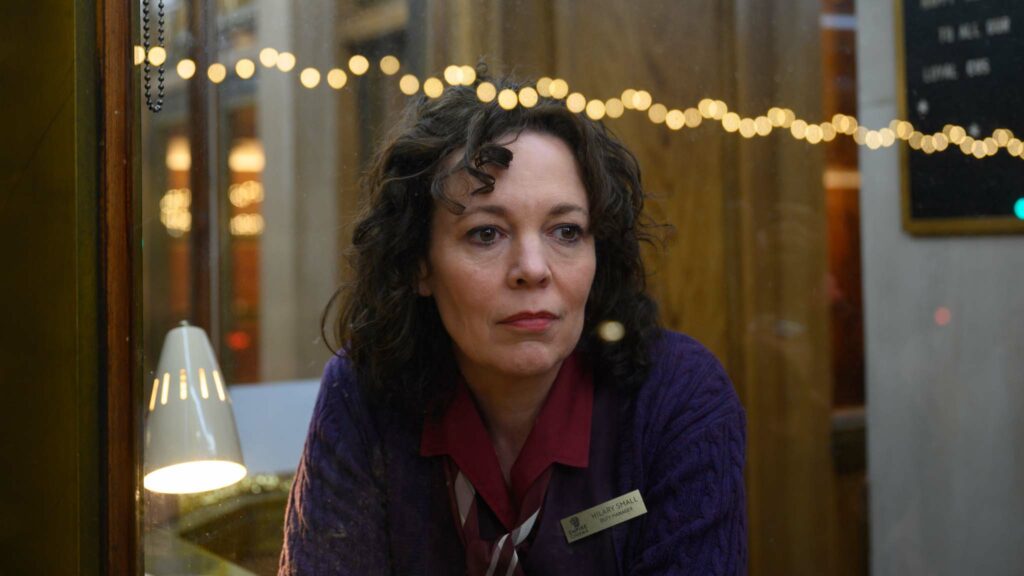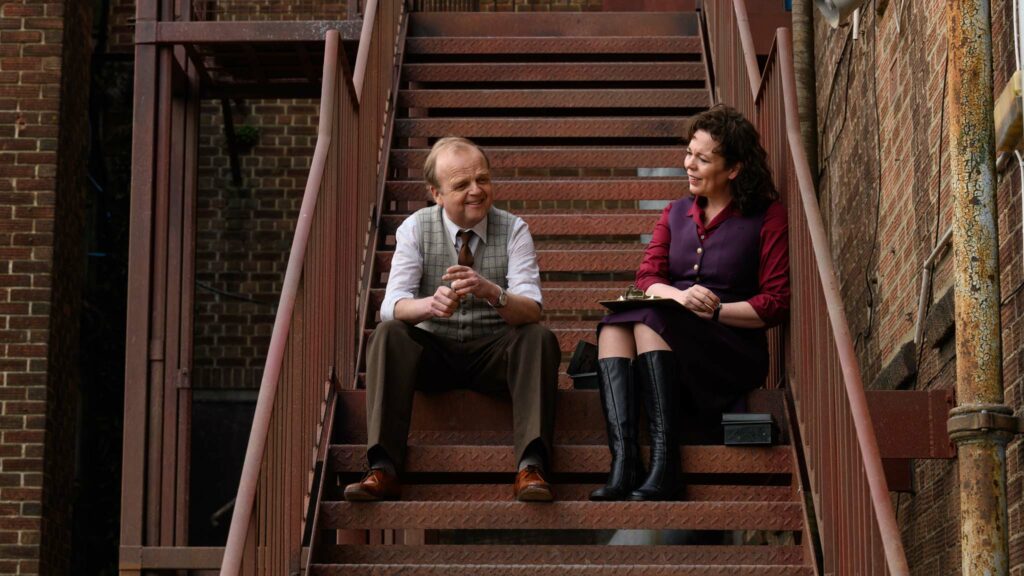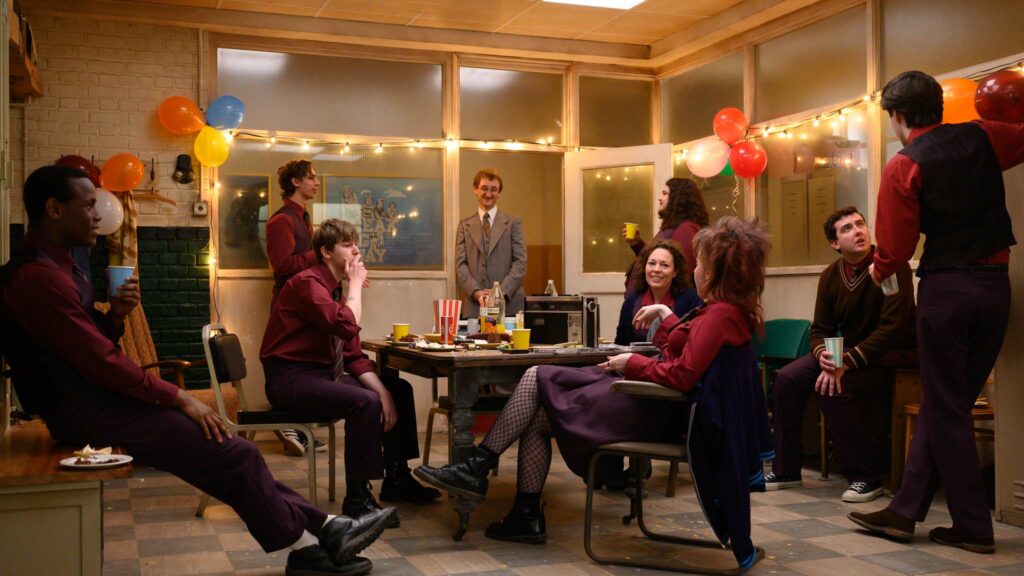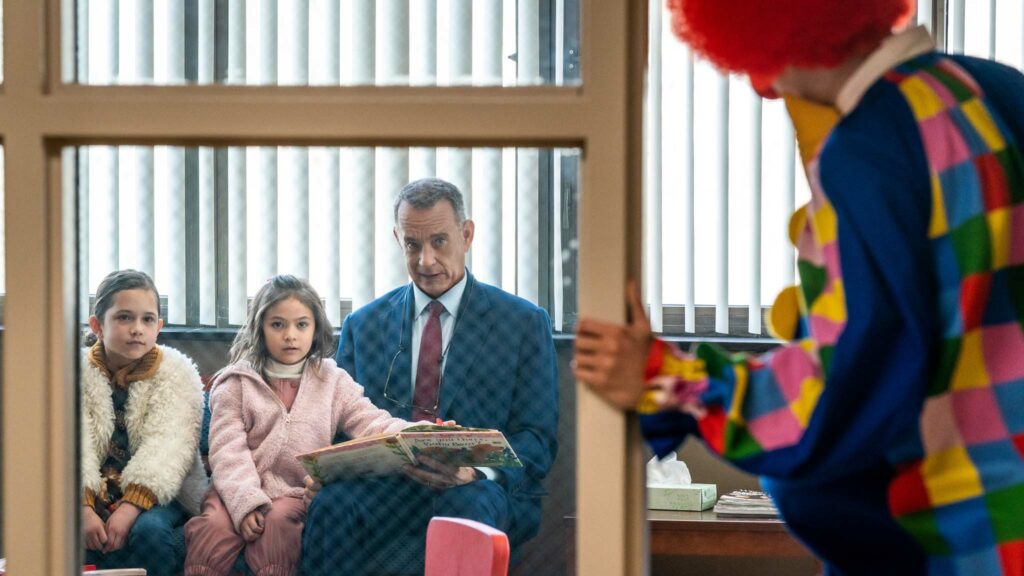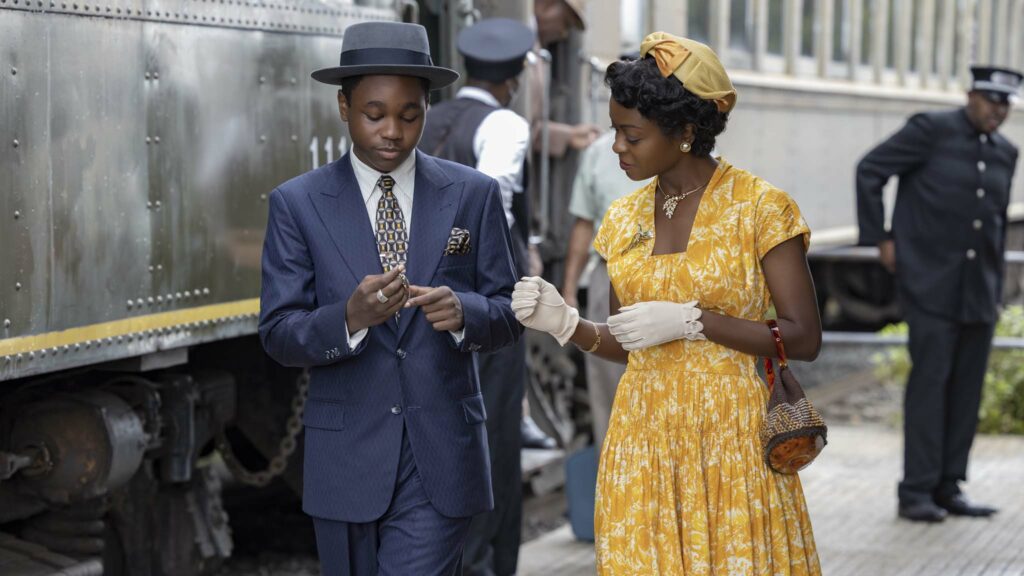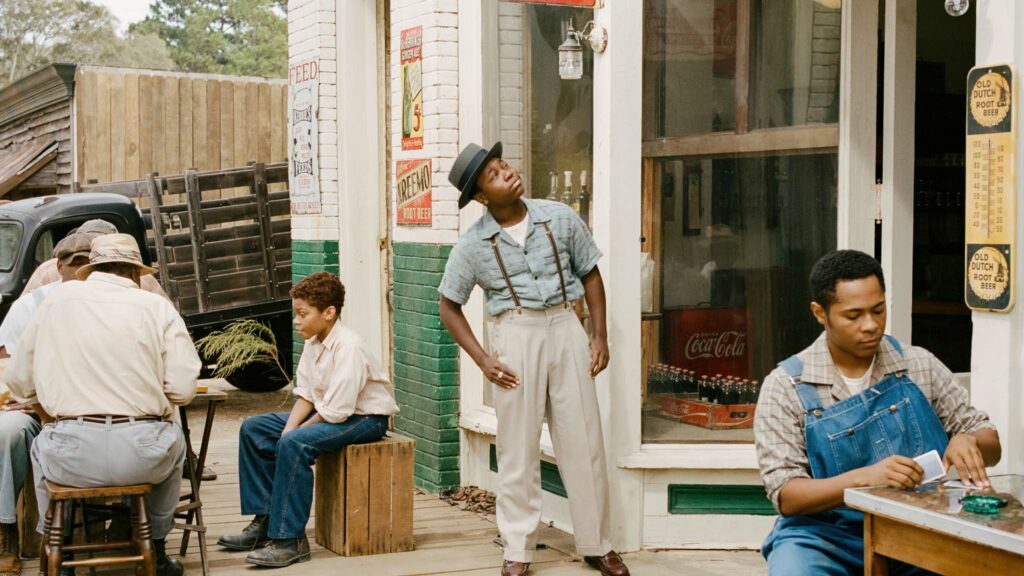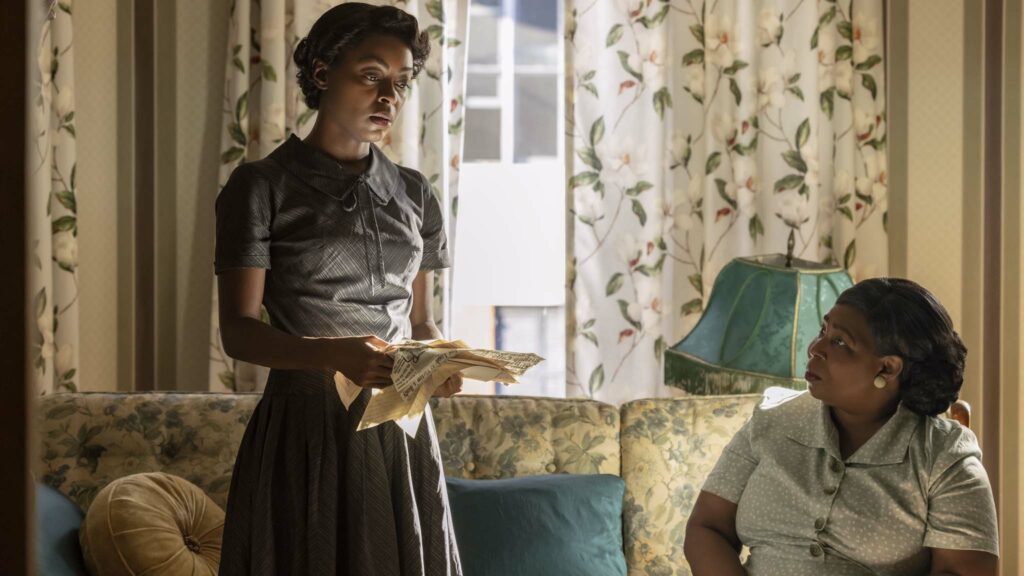Drama
Empire Of Light (15)
Review: Writer-director Sam Mendes’ unabashed love letter to the moving image unfolds in a fading picture house on the English coast in the early 1980s when an adult ticket cost £1.50 and a box of Maltesers from the concessions stand would set you back two shiny 10p pieces. On the big screen, the Elwood brothers played by John Belushi and Dan Aykroyd loudly preached Everybody Needs Somebody To Love and on the streets of Thatcherite Britain, the National Front clashed violently with police.
Racial tensions provide the hastily sketched backdrop to Mendes’ intimate character study informed by memories of his mother’s struggles with mental illness, necessitating an abrupt change of tone for the second half that hinges on a dazzling central performance from Oscar-winner Olivia Colman. She is perpetually luminous when Mendes’ script feels dim and unfocused, navigating mood swings of a diagnosed schizophrenic who stops taking her prescribed lithium and spirals in front of the one person who genuinely cares about her. A workplace romance with co-star Micheal Ward is artfully shot but his character is underwritten and Mendes barely scratches the surface of bigotry and intolerance of the era.
Empire Of Light opens in late December 1980. The Blues Brothers and All That Jazz are playing on the two remaining screens of a cinema managed by Donald Ellis (Colin Firth). An art deco chandelier and faded murals hint at the building’s glorious past and an inscription on one wall – “Find where light in darkness lies” – feels like a futile exercise for duty manager Hilary Small (Colman). She is embroiled in a grubby affair with her boss behind the back of his wife Brenda (Sara Stewart). “We’ve been sleeping in different rooms since last summer,” Donald assures Hilary. “She won’t even make me a cup of tea.”
A new member of staff called Stephen (Ward) jolts Hilary out of her rut. He introduces her to two-tone music and shares details about his life such as a burning desire to study architecture. “No one’s going to give you the life you want, you have to go out and get it,” Hilary encourages him. Donald excitedly reveals the cinema will host the regional gala premiere of Chariots Of Fire and Hilary and Stephen join other purple-uniformed staff in sprucing up the place while projectionist Norman (Toby Jones) eagerly awaits the arrival of film canisters.
Empire Of Light is a valentine to the communal experience of cinemagoing. Colman is terrific and Jones casts a warm, avuncular glow in the projection booth, preaching about the flaw in the optic nerve that creates the illusion of motion when a film runs at 24 frames per second. “An illusion of life,” he gushes. That feels like a fitting summary of Mendes’ beautifully crafted but tonally uneven picture.
Find Empire Of Light in the cinemas
Comedy
A Man Called Otto (15)
Review: Misery loves the company of Tom Hanks in director Marc Forster’s English-language remake of the 2015 Swedish comedy drama A Man Called Ove, adapted from the novel by Fredrik Backman. The two-time Oscar winner plays a socially awkward 60-something curmudgeon, who intends to take his own life so he can be reunited with his late wife but is repeatedly distracted from the grim task by unsuspecting neighbours. Screenwriter David Magee transplants the darkly humorous subject matter from Scandinavia to the snow-laden American Midwest but retains the core emotional values of Hannes Holm’s original script including a dewy-eyed resolution that targets tear ducts almost as ruthlessly as the fictional Dye & Merica real estate agency identifies elderly residents in Otto’s neighbourhood for hasty relocation to the nearest care home.
A Man Called Ove was nominated for two Academy Awards including Best International Feature Film. Despite an endearing lead performance from Hanks and a luminous supporting turn from Mariana Trevino, it’s unlikely that Forster’s picture will be troubling Oscar voters but A Man Called Otto still charms and uplifts without apology. It’s wholesome, socially conscious, crowd-pleasing fare that recruits Hanks’s youngest son Truman to portray Otto in heart-tugging flashbacks.
Six months have passed since since Otto Anderson’s schoolteacher wife Sonya (Rachel Keller) lost her hard-fought battle with cancer. The misanthropic widower has grown increasingly resentful of cheerful neighbours in his housing community who refuse to display parking permits on their rear-view mirrors, or recycle glass bottles in a bin clearly designated for paper. He is a stickler for rules and regulations and Otto takes umbrage with a clerk at a hardware store who charges him for six feet of rope when he only requires five feet to fashion a noose to hang himself in the living room.
During the suicide attempt, Otto is interrupted by heavily pregnant Marisol (Trevino) and her husband Tommy (Manuel Garcia-Ruflo), who are moving into a house across the street with their two cherubic girls, Luna (Christiana Montoya) and Abbie (Alessandra Perez). Despite Otto’s best efforts to scare off Marisol with his brusque demeanour, she breaks down his defences with kindness and home cooking. The ebullient mother-to-be encourages Otto to confront his demons and rediscover the simple joys of living in the company of neighbour Jimmy (Cameron Britton) and one of Sonya’s former students, transgender teenager Malcolm (Mack Bayda).
A Man Called Otto casts a warm glow and ultimately teases out Hanks’s nice guy persona but not before the eponymous grouch has slammed his front door in neighbours’ faces and rudely dismissed almost everyone in his orbit as idiots. Trevino is an irresistibly bubbly tonic and a pleasing counterpoint to Hanks’s exasperated eye rolls and growls. She hugs Otto and us into submission.
Find A Man Called Otto in the cinemas
Drama
Till (12A)
Review: In August 1955, 14-year-old Emmett Till was lynched in Mississippi during a visit to his cousins. He was accused of making inappropriate advances to a white female store owner. Two men stood trial for killing Emmett and were found not guilty by an all-white jury. The following year, the men admitted to the crime in a magazine interview, protected against prosecution for the same offence by the double jeopardy clause in the US Constitution. Director Chinonye Chukwu’s harrowing drama relives this shocking chapter in modern US history and the subsequent quest for justice spearheaded by Emmett’s mother, Mamie Till-Mobley.
Danielle Deadwyler electrifies every frame of Till as the grief-stricken yet defiant matriarch, urging her boy to be on his best behaviour in Mississippi (“Be smart down there”) and passionately advocating solidarity at a Harlem rally to effect change (“The lynching of my son has shown me that what happens to any of us, anywhere in the world, had better be the business of us all.”) A script co-written by Michael Reilly, Keith Beauchamp and Chukwu is respectful to a fault and exercises restraint at the most critical juncture (Emmett’s horrific final moments are heard but not seen.)
Mamie Till-Mobley (Deadwyler) lives in a middle class, all-black neighbourhood of 1955 Chicago with her 14-year-old son Emmett (Jalyn Hall), who is about to visit his cousins down in Mississippi. She is reluctant to let her boy stray outside the city limits. “I don’t want him seeing himself the way those people are seen down there,” Mamie tells her mother Alma (Whoopi Goldberg), but she nervously relents and Emmett travels to the town of Money – population 398 – with his cousins Maurice (Diallo Thompson), Wheeler (Gem Collins) and Simmy (Tyrik Johnson).
At the Bryant’s Country Store, Emmett violates an unspoken code of conduct by paying 21-year-old white proprietor Carolyn Bryant (Haley Bennett) a compliment: “You look like a movie star.” In the dead of night, Carolyn’s hot-headed husband Roy (Sean Michael Weber), and accomplices, drag Emmett from his cousins’ home. A grief-stricken Mamie insists on an open coffin and the US is confronted with shocking images of Emmett’s bludgeoned face, which intensifies efforts by the NAACP to introduce legislation.
Till is a deeply affecting history lesson that does not stray outside clearly marked dramatic lines that relate to the court case and its aftermath. Deadwyler is sensational and richly merits a seat at the Academy Awards nominations table, with sterling support from Hall, who exudes fresh-faced innocence from his opening scene. Period detail is impeccable. As a bruising parting shot, closing title cards remind us that lynching only became a federal hate crime in March 29, 2022 when President Joe Biden signed The Emmett Till Antilynching Act into law. Chukwu’s picture could not be more timely.
Find Till in the cinemas


